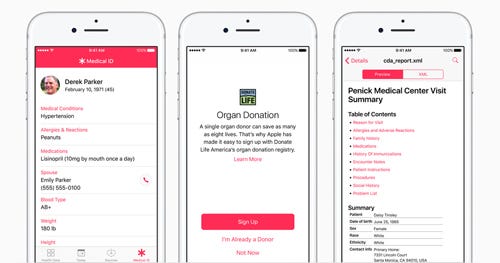What Apple Really Wants to Do With HealthKit
September 26, 2016
Collecting data is one thing. Using it to improve healthcare worldwide is another.
Maureen Kingsley

Apple wants to take its HealthKit software platform to the next level, from simply collecting health and fitness data to analyzing it, interpreting it, and using it to advise users and healthcare providers, reports Bloomberg, citing people familiar with Apple's plans.
HealthKit, launched in September 2014, is Apple's developer framework that collects data from various iOS-friendly health and fitness apps and displays it to users through Apple's Health app, which was first made available on the iOS 8 operating system. HealthKit also makes it possible for its member apps to share user information with each other.
In recent years, Bloomberg reports, healthcare specialists recruited by Apple have been developing improved electronic-health-record software for actually putting all of that collected data to work for users and care providers, ultimately to offer wellness and medical advice and assist in diagnoses.
A beefed-up version of HealthKit, with the help of better electronic-health-record software, could potentially address two outstanding concerns that remain inadequately addressed: transferring health data reliably and securely among databases at various hospitals and doctors' offices, and helping providers to quickly access and analyze "salient information from mountains of data," the report states.
To this end, Apple earlier this year bought three-year-old Silicon-Valley startup Gliimpse Inc., a firm founded by Anil Sethi (now director of Apple Health) that has created software that pulls electronic health records from different databases and in different formats, then stores them in one place.
Could Apple be taking a stab at solving medtech's EMR interoperability problem? It kind of seems that way.
Apple's ResearchKit framework, too, seeks to change the "information silos" model of patient-data storage to one of shareable, accessible data from across the world, and leverage it to benefit medical research.
Apple also continues developing new apps for the Apple Watch, particularly those related to wellness, according to Bloomberg's sources. One such app helps users track sleep patterns; another "gauges fitness levels by measuring the time taken for the heart rate to fall from its peak to resting level." Apple does currently have a Watch app that measures heart rate, but that app does not analyze or interpret the data in any way.
The latest report is in line with Apple's high interest in continuing its push into mobile and connected healthcare. This summer, the company published guidelines for mobile medical app (MMA) developers that take steps toward addressing the unique safety, privacy, and regulatory concerns of MMAs.
Maureen Kingsley is a contributor to Qmed.
Like what you're reading? Subscribe to our daily e-newsletter.
[Apple Health image courtesy of Apple]
About the Author(s)
You May Also Like

.png?width=300&auto=webp&quality=80&disable=upscale)
